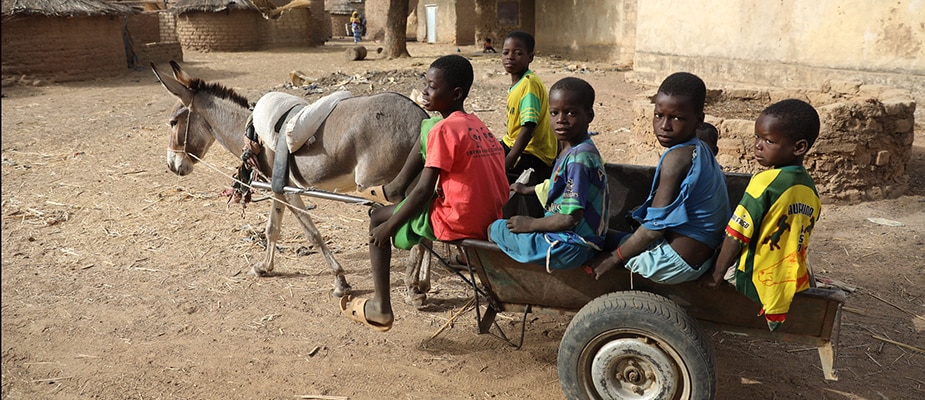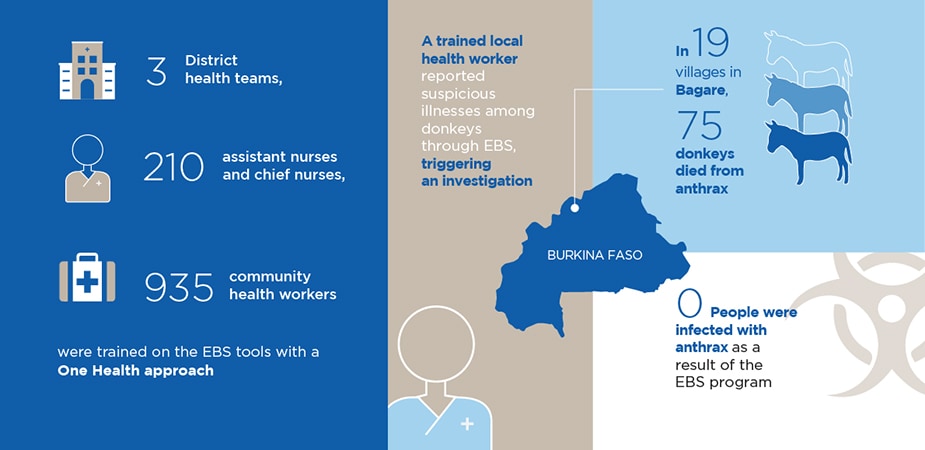Burkina Faso’s Disease Detective System in Action
December 9, 2019

As Ebola spread across West Africa from 2014-2016, so did the fear and recognition that everyone was at risk. The outbreak showed that safeguarding public health meant that nations needed to rethink their surveillance strategies and apply sustainable and effective outbreak warning systems.
Located in the heart of West Africa, Burkina Faso took the threat of a disease outbreak seriously. The country decided to pilot a bold and innovative disease surveillance approach by engaging communities in early detection of potential infectious disease threats.
Sounding the Alarm on Emerging Health Threats
In 2017, Burkina Faso’s Ministry of Health (MOH), with strong technical support from the CDC, implemented a community event-based surveillance (EBS) pilot system. Community members and local health workers were trained to identify and report unusual health events to quickly detect potential human or animal outbreaks. Local health workers acted as frontline disease detectives who could sound the outbreak alarm and bring attention to emerging health problems. The pilot EBS system provided tools, operating procedures, and necessary training and mentoring for community health workers. It equipped frontline healthcare staff with the knowledge and skills needed to successfully identify emerging public health threats.
It was not long before the pilot EBS system would face a significant test.
Event-Based Surveillance in Action
In December 2018, a community health worker in the Kongoussi health district reported strange symptoms among local donkeys. Many of the animals suffered severe respiratory distress, coughing and struggling to breathe. The unexplained illness resulted in the sudden deaths of several donkeys. By January 10, 2019, the mysterious illness had spread to other areas, and the Ministry of Animal and Fisheries Resources (MRAH) reported approximately 140 donkey deaths. Ten out of 38 communes in Kongoussi also reported animals with similar symptoms, and other regions reported the outbreak through the EBS pilot program.
The government had to act quickly. A team of health and animal resource workers joined forces to investigate the cause of the outbreak. Laboratory results identified the illness as strangles, a contagious, infectious disease of the upper respiratory tract of donkeys, horses, and mules, caused by the bacterium Streptococcus equi. The MOH and MRAH called for regular meetings with key partners including CDC, U.S. Agency for International Development (USAID), World Health Organization (WHO), and Food and Agriculture Organization (FAO) of the United Nations. During these meetings, investigators discovered that there were other cases of sick donkeys in Bagare (in Northern Burkina Faso), where the animals tested negative for strangles but positive for anthrax. Through effective field investigations, the team confirmed the presence of anthrax in the donkey population. In 19 villages in Bagare, over 75 donkeys died, but a rapid response introduced control measures and ultimately prevented the disease from spreading to humans.
Providing a Model for the Future
Since the launch of the CDC-supported EBS in 2017, three district health teams, 210 assistant nurses and chief nurses, and 935 community health workers have received EBS tool training. The EBS curriculum also now includes the One Health approach, which considers the connection between human, animal, and environmental factors in the spread of infectious diseases. Early identification of animal disease outbreaks helps reduce the risk of serious losses of livestock as well as disease spread to people.
Burkina Faso’s success with the EBS program is a model for other countries seeking to improve community-level surveillance. The EBS program has become a key part of Burkina Faso’s health system. This sustainable intervention can better protect public health by strongly improving disease surveillance throughout the country.
